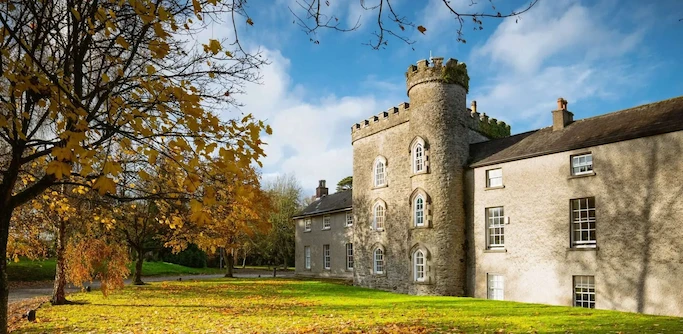Table of Contents
Does Giving up Alcohol Make You Depressed?
Depression and alcohol misuse are interconnected in many ways.
For some, depression causes alcoholism; for others, it comes from drinking. And for some people, depression hits after giving up alcohol.
You might be asking then, what’s the point of becoming sober if you’re only going to feel worse? But this post-alcoholic depression is often only temporary.
For instance, alcohol withdrawal can cause depression symptoms. For another, it can take time for you to adjust to coping without alcohol.

Download our Brochure
Many people in recovery claim that sobriety is “the best thing that’s ever happened to them”. Indeed, abstinence was not easy for them all.
The majority of those people probably experienced the depression of sobriety themselves. But despite difficulties, they have overcome it, and you can too.
Although it doesn’t happen to everyone, depression in recovery from alcohol misuse or alcoholism is quite normal. Even moderate drinkers face depression after quitting alcohol. It can happen for several reasons, but it can lead to relapse if not addressed.

Why Does Depression After Alcohol Even Happen?
Depression can happen to anyone.
As someone in recovery, especially in the early stages, you might be more prone to it.
There are many reasons for this, and it is a good idea to understand them all.
Whether you’re facing depression or anticipating it once you quit, knowing what can cause depression can help you deal with it.
Alcohol Withdrawal and Depression
Depression is a common symptom of alcohol withdrawal and can also happen with any addiction. Alcohol, in addition to psychological reasons, there is the biological reason.
First, there is nothing more to artificially boost your dopamine.
Your brain’s reward system is in shock, and it will take time to recover.
Second, long-term alcohol misuse can cause depression and further brain impairment.
Studies have shown that alcohol can cause emotional instability and worsen depression. This, unfortunately, can linger long into sobriety.
When it comes to alcohol, you may also end up experiencing physical withdrawals, which are not pleasant.
If you don’t have good coping strategies for dealing with these feelings, it can spiral into depression after quitting alcohol.
- You’re Facing a Tragic Loss
One of the first things that may come to mind is the loss of your best friend. Quitting alcohol or any drug can feel like a horrible breakup.
If you have been addicted for some time, you may even have had moments where alcohol was a better friend to you than people.
In sobriety, you might feel like you’ve lost a part of your personality.
On the other hand, you might end up losing actual friends.
You’ve likely had a group of buddies that you hung out with to drink.
You might see them as a bad influence, or they might see you as “not one of us” anymore.
It’s always painful to lose a friend, especially when dealing with early recovery.
2. Things Don’t Seem Fun Anymore
It can be hard to imagine a life without a drink in the alcohol-fuelled modern world, let alone a social life.
Will you no longer be able to go to parties, hang out with your friends at the pub, or enjoy a birthday toast? Such speculations can cause you to overthink and imagine that your life will be boring.
Alternatively, perhaps you plan to enjoy social events sober in the future but are abstaining from them.
It can be a major downer to deny invitations because of the fear of relapse.
It is essential to remember that the wait is worth it in either situation.
Plenty of people lead very social, highly fulfilling lives without alcohol. You can too.

Contact Us Today
3. Challenges Get More Challenging
When you were drinking, alcohol was probably a coping mechanism for when things got complicated. Now, that is no longer the case.
Therefore, when you encounter problems, you might feel unable to cope as well as before. The added stress and any other strain you face in recovery can lead to depression after giving up alcohol.
Remind yourself that every problem you face up to, and handle without alcohol, will boost your confidence, but you have to do it to receive positive feedback.
Therefore, face the more minor challenges first to tackle the harder ones later.
The lack of alcohol can also be problematic if you use it to be more functional.
For example, if you fear public speaking, you might have reached for a drink to soothe your nerves beforehand.
4. You’re Still an Alcoholic
The many challenges you face in recovery can bring you down.
Relapse, should it happen, can make you feel like a failure.
Even if you’re successful in your sobriety, you might still encounter discouraging messages from your family and friends.
This can quickly become overwhelming, especially without proper support, and prompt you to give up altogether.
How To Deal With the Depression After Giving up Alcohol
Depression is not something that can be cured overnight.
Remember that alcohol withdrawal can cause depression – which means you will need to wait for your body to adjust.
And if it lasts longer, you will need to take time to understand its root causes and address them.
It could very well be that you were depressed before you started drinking and were self-medicating with alcohol.

Get Help and Advice for Your Addiction Today
However, there are steps you can take to alleviate the depression that comes after quitting alcohol:
- Simple Self-care
It may seem cliche, but the old advice of eating well, sleeping sufficiently, and exercising plenty are some of the simplest and best things you can do.
If you take care of yourself, you will feel better about yourself.
Take time to do things that you enjoy, such as reading a good book, and treat yourself occasionally.
They can make a huge difference and relieve stress, which often triggers depression.
-
Discover (Or Rediscover) A Hobby
One of the signs of depression is losing interest in the things you once enjoyed, so you may not feel motivated to do anything.
However, now it is more important than ever to try. Try to tag along with a friend if you can, so you’ll be less likely to quit.
If your old hobbies don’t seem right anymore, don’t be afraid to try something new.
Don’t overwhelm yourself with a significant commitment, such as learning to play an instrument.
Instead, attend a lesson and see how you feel first. Then, now that you’re not drinking or recovering from hangovers, you have more time to discover all life’s things.
-
Don’t Neglect Aftercare
Therapy is a crucial aspect of recovery for a reason.
It teaches you how to cope in challenging moments such as this.
Having someone to support you in difficult times is essential as well.
If you don’t have a person to rely on, regular AA meeting attendance can help keep things in perspective.
Many other people at these meetings have experienced the same depression after giving up alcohol that you are going through.
Talk to these people, get guidance, and stay focused on recovery.

Safe Detoxification from Drugs & Alcohol
-
Stay Busy to Combat Depression After Quitting Alcohol
It can help to keep a full schedule.
It will help distract you, but being productive will also raise your self-esteem.
Without taking on too much, organise your day, so you feel accomplished at the end of the day.
Hobbies help, but so can work or volunteering. Try to take on a project where you see the result of your hard work. It will keep you motivated.
It can also help make plans for the future, so you have something to look forward to.
-
Focus on the Future
It is always darkest before dawn. You may not feel it now, but things will improve in time.
Remind yourself of how far you’ve come, and you’ll soon see there’s a light at the end of the tunnel. Keeping a positive outlook can help you keep going in difficult times.
Look ahead as well. But don’t think too big.
Early recovery is about taking small steps, but each action you take will increase your sense of making positive progress.
Now that you’re sober, you have your whole life ahead of you and much to look forward to.
Make some short-term and long-term goals, and take small steps towards them.
In time, this moment will pass, and when you look back on it, it won’t seem that bad.

If you are managing your recovery right, you will soon start to feel a sense of purpose in what you are doing, a sense of competence in your abilities, and belonging in your new life.
These will all boost your well-being and self-esteem. When this happens, feelings of depression will diminish.
Get in touch with us here for help or support with depression alongside alcoholism or drug addiction. Our rehab uses medically managed and monitored detoxes, paired with evidence-backed therapies to deliver a high standard of care that has seen thousands of patients recover.



